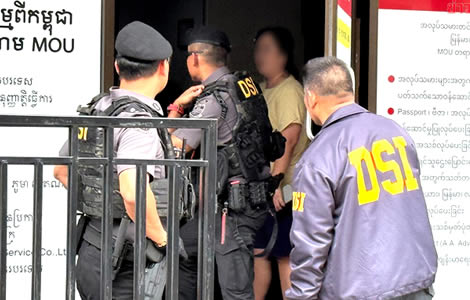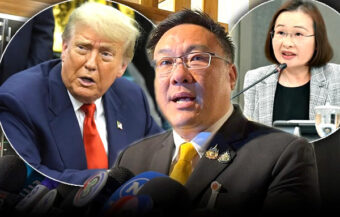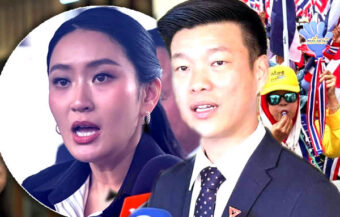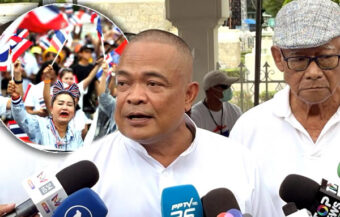Tensions rise in Thailand as political forces clash over reform of the 2017 constitution, with conservative power rising and activist threats pushing the government to act. PM Paetongtarn faces complaints as reform ambitions stir fears of political instability.
Presently in Thailand, there are simmering tensions within and outside the government. In short, both the People’s Party and the Pheu Thai Party, control over 61% of public support. They want to see the constitution reformed. In particular, they want to see a reduction in the powers of oversight agencies and the Constitutional Court. In effect, they want to see a more powerful, stable and democratically representative government. One decisively able to establish and implement policy. The feeling is that the junta-inspired and crafted constitution was specifically designed to impede decisive governance. These moves come with more complaints in the system against both leading political parties. In turn, this could certainly see a conservative party, at some point, form a government within this parliamentary term.
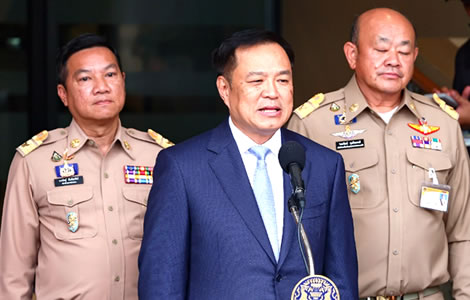
Tensions are running high within the government over proposals and plans to amend the 2017 Constitution. In short, pro-democracy activists and rank-and-file MPs from both the Pheu Thai Party and People’s Party think such a move is essential.
The charter was introduced by the junta in 2017, in truth, under restricted debate conditions. Certainly, it is considered not only flawed but also deliberately crafted to reduce the power of elected politicians.
In particular, the charter accords massive and sweeping powers to powerful independent agencies.
Prime Minister Paetongtarn halted constitutional moves last week amid flood crisis but they are not dead yet
These include the National Anti-Corruption Commission (NACC), the Election Commission, and most significantly, the Constitutional Court.
Last week, Prime Minister Paetongtarn Shinawatra deftly suspended activity on the issue. Ms. Paetongtarn announced that dealing with the flooding crisis was more important. However, her government, and indeed her own position, are in the crosshairs of various complaints to the oversight agencies.
Prime Minister Paetongtarn is the people’s favourite for the top job according to latest NIDA poll
Government is already divided as the PM shelves efforts at amending the 2017 Constitution on ethics
The problem with the 2017 Constitution is that relatively insignificant matters can arise to effectively dismiss Prime Ministers and governments. In particular, within the Pheu Thai Party ranks, there is ill will regarding what happened to former Prime Minister Srettha Thavisin over the appointment of an unfit minister. However, that case may have been justified, given that the minister had previously been found in contempt of court, particularly for attempting to bribe Supreme Court officials.
However, many of the pretexts for removing ministers and officials are minor and petty. In short, the wording of the 2017 charter is too wide, while the powers of the oversight agencies and the court are too sweeping.
Removal of former Prime Minister for hosting a TV show highlights previous constitutional flaws and thinking
Previously, under another constitution, a Thai Prime Minister, Samak Sundaravej, of the People Power Party, was removed in 2008 for hosting a TV cooking programme.
Presently, significant complaints are being processed against Paetongtarn Shinawatra to remove her as Prime Minister.
One, in particular, relating to shares held by the young PM in a golf course, is likely to become problematic.
At the same time, there are also other problems with the 2017 Constitution that serve to stifle the voice of the electorate.
Significantly, political parties such as the Bhumjaithai Party and Palang Pracharat Party appear to perform well within the current political system at a level far ahead of their popular support on the ground.
For example, in this weekend’s National Institute of Development Administration (NIDA) poll, both the Pheu Thai Party and the People’s Party combined had the support of 61.4% of the electorate. The Bhumjaithai Party and Palang Pracharat Party combined enjoyed just 5.6% support. Indeed, the Democrat Party, United Thai Nation (Ruam Thai Sang Chart) Party, and these other two conservative parties had only 19.95% of the electorate behind all of them combined.
Conservative parties maintain power base despite low public support, electoral system also under scrutiny
Furthermore, the Prime Minister nomination rules also threaten to restrict democratic representation. For instance, should a diasaster befall the Pheu Thai Party, its nominees for Prime Minister would be invalidated. In turn, the country’s choice for the next Prime Minister will be limited to conservative parties. These being the Bhumjaithai Party, Palang Pracharat Party, and United Thai Nation (Ruam Thai Sang Chart) Parties.
In the meantime, against this backdrop, the Pheu Thai Party is working within the government with the Bhumjaithai Party. While its leader, Deputy Prime Minister and Minister of the Interior Anutin Charnvirakul, pledges support for constitutional change, he has already voiced opposition to relaxing the ethics provisions.
Furthermore, this week, the Senate voted to amend Article 13 of a proposed referendum bill requiring a two-tier majority to pass. This proposal was put forward by Senator Police Lieutenant General Chatwarat Saengphet, the Chairman of a Senate Committee.
On Tuesday, after the cabinet meeting at Government House, Minister of the Interior Anutin was asked about this. It is widely accepted that the Bhumjaithai Party controls up to 70% of Thailand’s Senate or Upper House.
Anutin denies influence over Senate, but Bhumjaithai’s sway on the country’s politics has become impressive
However, Deputy Prime Minister Anutin stoutly and consistently denies this. At length, he insists that he is the leader of the Bhumjaithai Party and has no links with Senate members.
Nonetheless, it is believed that the Bhumjaithai Party discovered a way to control the electoral voting system used in the last Senate election. In short, this system made candidates network and manoeuvre to get elected across a range of panels.
Therefore, at this time, it is known that the Bhumjaithai Party leader holds significant power over any effort to amend the constitution. Such legislation needs to be approved by both the House of Representatives and the Senate.
Indeed, the whole process is mind-blowingly difficult to understand. Consequently, Thai voters do not fully grasp what is happening.
At the same time, contentious issues will arise. For instance, plans to grant an amnesty linked with the political struggles over the last few decades. The Bhumjaithai Party and conservative parties have already laid down a marker. This must not apply to those convicted under Article 112, the lèse-majesté law.
Political activist Sondhi Limthongkul threatens protests as tensions rise over constitutional amendments
In the meantime, a former street protest rally leader, is threatening a rerturn to chaos. Mr. Sondhi Limthongkul of the People’s Alliance for Democracy, has reactivated his interest in politics. The former yellow shirt leader is threatening street protests against the government of Paetongtarn Shinawatra in 2025.
Undoubtedly, the government’s efforts to amend the constitution could prove a fiery rallying cry. In short, Ms. Paetongtarn Shinawatra and her government could be accused of trying to shake off rigorous oversight. The government, in contrast, sees it as pushing for democratically representative and stable governance.
In truth, the situation looks bleak for Thailand. It looks like the same political forces and divisions are reemerging. A key question is who is driving the discord. Indeed, that question was never answered either in 2014 or in 2006.
Anutin insists on a party leaders’ meeting over charter change. Denies Senate connection on referendum law
On Tuesday, Deputy Prime Minister Anutin suggested that any effort to amend the 2017 charter must follow a meeting of party leaders. He pointedly denied any links with Senate members. At the same time, he denied any connection to the Senate’s efforts to introduce a two-tier majority requirement for any referendum vote.
In short, this would require both a majority of the vote and a majority of the eligible voters for such a vote to pass.
Certainly, at one point, he asked who suggested that Bhumjaithai was behind efforts to make a constitutional referendum more difficult to pass. Reporters answered that it was Senator Nantana Nantawaropas.
Senator Nantana was elected to the Mass Media and Literature panel this year. The former dean of Krisk University is seen as a key leader among 30 senators in the 200-member house who are seen as pro-democracy reformists.
Join the Thai News forum, follow Thai Examiner on Facebook here
Receive all our stories as they come out on Telegram here
Follow Thai Examiner here
Further reading:
Prime Minister Paetongtarn is the people’s favourite for the top job according to latest NIDA poll
Government is already divided as the PM shelves efforts at amending the 2017 Constitution on ethics
People’s Party on campaign but on guard against potential legal complaints to oversight agencies
Wealthy young People’s Party leader aims to create a technology-driven and efficient welfare state
Inward immigration may ultimately be the only thing that can halt Thailand’s fated economic decline
Thailand’s days of GDP growth in excess of 5% may be a thing of the past as it has grown too old
Cabinet in pension move as the number of working Thais to over 60s is set to half in 20 years
Thailand’s new move to boost the birth rate and fight the negative impact of an ageing population

